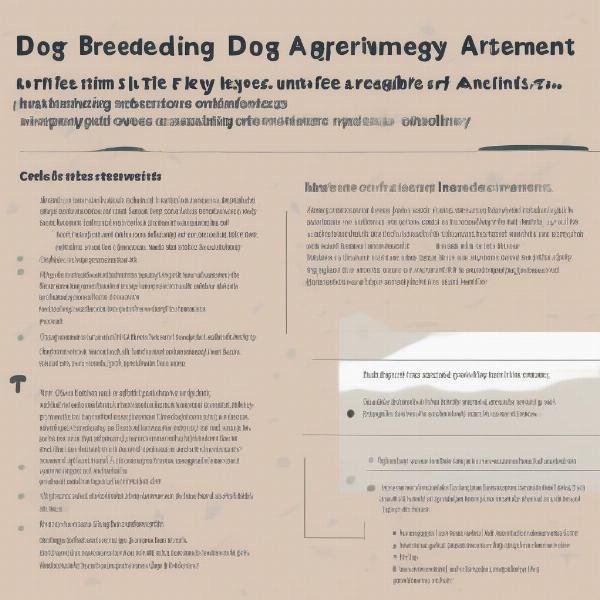A dog breeding agreement, sometimes called a co-ownership agreement or breeding contract, is a legally binding document outlining the terms and conditions between two or more parties involved in the breeding of a dog. It protects the interests of everyone involved, from the owner of the stud dog to the owner of the dam and future puppy owners. Whether you’re a seasoned breeder or considering breeding your dog for the first time, a well-drafted agreement is crucial for a successful and ethical breeding process.
What is a Dog Breeding Agreement and Why Do You Need One?
A dog breeding agreement clarifies expectations, responsibilities, and ownership rights. It helps prevent misunderstandings and potential disputes that can arise during or after the breeding process. This contract covers crucial aspects such as stud fees, health testing requirements, litter ownership, and the responsibilities of each party involved. Without a dog breeding agreement, you’re leaving yourself open to potential legal issues and heartache.
Key Elements of a Dog Breeding Agreement
A comprehensive dog breeding agreement should include several essential elements:
- Identification of the Parties: Clearly identify the owners of the stud and dam, including their full names, addresses, and contact information.
- Stud Fee and Payment Terms: Specify the stud fee, whether it’s monetary or pick of the litter, and the payment schedule.
- Breeding Details: Outline the breeding arrangements, including the dates and location of the breeding and any special conditions.
- Health Testing Requirements: Specify the required health tests for both the stud and dam, ensuring healthy puppies. This might include tests for hip dysplasia, eye disorders, and genetic diseases.
- Litter Ownership and Registration: Detail the ownership of the resulting litter, including the registration process and the allocation of puppies.
- Responsibilities for Puppy Care: Outline the responsibilities of each party for the care and well-being of the puppies, including feeding, vaccinations, and socialization.
- Guarantees and Warranties: Include guarantees about the health and temperament of the puppies, and address potential issues such as congenital defects.
- Breeder’s Responsibilities: Clearly state the breeder’s responsibilities regarding the health and welfare of the dam and the litter.
- Dispute Resolution: Outline a process for resolving disputes that may arise during or after the breeding process.
 Key elements of a dog breeding agreement displayed on a document.
Key elements of a dog breeding agreement displayed on a document.
Navigating Common Breeding Agreement Challenges
Even with a well-drafted agreement, challenges can arise. Be prepared for potential disagreements regarding the interpretation of the contract, unexpected veterinary expenses, or disagreements over the placement of puppies. Open communication and a willingness to compromise are essential for navigating these situations.
“A well-drafted breeding agreement should anticipate potential problems and provide clear solutions,” says Dr. Emily Carter, DVM, a specialist in canine reproduction. “This proactive approach helps protect all parties and ensures the well-being of the dogs involved.”
Conclusion
A dog breeding agreement is an essential tool for responsible and ethical breeding. By clearly defining roles, responsibilities, and expectations, it protects the interests of all parties involved and ensures the well-being of the dogs. Careful planning and a comprehensive agreement are key to a successful and positive breeding experience.
FAQ
- What happens if one party breaches the dog breeding agreement? The aggrieved party may pursue legal action to enforce the terms of the contract.
- Is a verbal agreement sufficient for dog breeding? While a verbal agreement may be legally binding in some jurisdictions, a written contract provides much greater clarity and protection.
- Who is responsible for veterinary expenses for the dam during pregnancy and whelping? This should be clearly outlined in the breeding agreement.
- What if the litter is smaller than expected? The agreement should address contingencies such as small litter sizes or stillbirths.
- Can a dog breeding agreement be modified after it has been signed? Yes, but all parties must agree to the changes in writing.
- Where can I find a template for a dog breeding agreement? Consult with a legal professional specializing in animal law for a template tailored to your specific needs.
- Is it necessary to have a lawyer review the dog breeding agreement? It is highly recommended to have a lawyer review the agreement to ensure it is legally sound and protects your interests.
Related Articles on ILM Dog
Looking for more information? Check out these related articles: choke collar dog, dog prong collar, slip lead dog
About ILM Dog: ILM Dog is your trusted resource for expert advice on dog care, breeding, and training. We offer a wide range of resources, from breed selection guides to health and nutrition information, empowering dog owners to provide the best possible care for their furry companions. We specialize in breed selection, health and medical care, training, nutrition, grooming, and products & accessories. Contact us today for personalized guidance: Email: [email protected], Phone: +44 20-3965-8624.